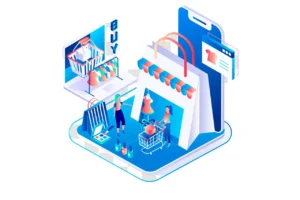Future of AI in Ecommerce
Artificial Intelligence (AI) continues to revolutionize ecommerce by offering innovative solutions to enhance customer engagement, streamline operations, and boost revenue. As we look to the future, the integration of AI in ecommerce is set to deepen, presenting transformative opportunities for businesses. Let’s explore the predictions and trends that will shape the Future of AI in Ecommerce.
Enhanced Personalization Through AI
Personalized customer experiences are the cornerstone of modern ecommerce, and AI will elevate this to unprecedented levels. Future advancements in AI-powered recommendation engines and chatbots will enable:

The Future of AI in Ecommerce: Predictions, Trends, and Transformations Hyper-personalized interactions: Leveraging data from browsing habits, purchase history, and preferences, AI will provide tailored product recommendations, ensuring that customers feel understood.
- Dynamic content delivery: AI systems will curate content dynamically to match individual customer preferences, creating seamless and engaging shopping experiences.
AI-Powered Augmented Reality (AR)
Augmented reality, driven by AI, is poised to revolutionize how customers shop online. AR tools powered by AI will allow customers to:
Visualize products in real-world settings : For example, trying out furniture in a virtual living room or testing makeup shades on a virtual face.
Enhance confidence in purchases : By providing a realistic preview of products, AI-driven AR can reduce returns and improve customer satisfaction.
Automation Across Operations
Automation will be a critical component of the future ecommerce ecosystem. AI will automate various aspects of operations, including:
Inventory management : Predicting stock levels and automating reordering processes to avoid overstocking or stockouts.
Customer support : AI chatbots will handle routine queries efficiently, allowing human agents to focus on complex issues.
Order fulfillment : Robotics and AI will streamline warehouse operations, ensuring faster and more accurate deliveries.
Predictive Analytics for Decision-Making
Predictive analytics, powered by AI, will play a pivotal role in ecommerce strategies. Businesses will leverage AI to:
Forecast customer behavior : Predict what products customers are likely to purchase based on past behavior and trends.
Optimize pricing strategies : Use dynamic pricing models that adjust in real-time based on demand, competition, and customer data.
Streamline marketing efforts : Identify high-value customers and craft campaigns that maximize engagement and ROI.
Voice Commerce Revolution
With the proliferation of voice-activated devices like Amazon Alexa and Google Assistant, voice commerce is set to become a dominant trend. The future will see:
Seamless shopping experiences : Customers placing orders using voice commands.
Integration with AI assistants : Businesses ensuring their products are optimized for search and purchase through voice-activated platforms.
AI-Driven Fraud Detection and Cybersecurity
As ecommerce transactions increase, so does the risk of fraud and cyber threats. AI will play a crucial role in ensuring secure online shopping experiences through:
Fraud prevention : Detecting suspicious activities and flagging potentially fraudulent transactions.
Enhanced cybersecurity measures : AI-powered tools identifying vulnerabilities and protecting customer data.
Sustainable and Ethical AI Practices
The Future of AI in Ecommerce is not just about efficiency and revenue growth; it also involves ethical considerations. Businesses will need to prioritize:
Data transparency : Clearly communicating how customer data is used to build trust.
Bias prevention : Ensuring AI algorithms are free from biases that may lead to unfair treatment of customers.
Sustainability : Using AI to optimize supply chains and reduce carbon footprints.
AI-Driven Customer Insights
Understanding customer needs and behaviors will become more precise with AI. Advanced AI tools will:
Analyze large volumes of data : Identify purchasing patterns and predict future trends.
Improve customer segmentation : Businesses can create more targeted marketing strategies based on AI-driven insights.
Enhance customer engagement : Delivering personalized promotions and messages to improve customer retention.
The Role of AI in Seamless Omnichannel Experiences
AI will bridge the gap between online and offline shopping experiences, ensuring a seamless omnichannel approach. Future developments will include:
Smart virtual assistants : Assisting customers both online and in physical stores.
Real-time inventory updates : AI-driven tools ensuring accurate stock visibility across multiple channels.
Personalized shopping journeys : AI understanding customer intent and providing a unified shopping experience across platforms.
The Future of AI in Ecommerce is bright, promising unprecedented advancements in personalization, automation, and security. As AI technology continues to evolve, businesses that embrace these innovations will stay ahead of the competition and deliver superior customer experiences. By investing in AI-driven solutions, ecommerce companies can optimize operations, enhance customer satisfaction, and drive sustainable growth.
AI is no longer just a trend; it is the future of ecommerce. Businesses that prioritize AI adoption today will be the leaders of tomorrow.
The future of AI in ecommerce promises even more advanced solutions, enabling hyper-personalization, automation, and intelligent decision-making. Let’s explore how AI will revolutionize ecommerce and other industries.
Hyper-Personalized Shopping Experiences
AI is set to redefine personalization in ecommerce. Future AI-powered recommendation engines will analyze customer behavior, preferences, and browsing history in real-time to suggest highly relevant products.
Example: Amazon’s Recommendation Engine
Amazon uses AI-driven algorithms to analyze customer purchase history and predict what they might buy next. This has significantly improved conversion rates and customer satisfaction.
Future Enhancements:
- AI chatbots will provide real-time product suggestions based on voice and text queries.
- Virtual shopping assistants will guide users through personalized shopping journeys.
- AI-driven dynamic content will adjust website layouts based on customer behavior.
AI-Powered Augmented Reality (AR) for Shopping
AI-driven AR technology will transform how customers interact with products online.
Example: IKEA Place App
IKEA uses AR technology to let users visualize furniture in their homes before making a purchase. AI algorithms ensure precise product placement for a realistic shopping experience.
Future Enhancements:
- AI-powered AR will allow customers to try on clothing virtually.
- Home decor businesses will enable real-time product visualization.
- AI-driven size and fit recommendations for fashion ecommerce.
Automation in Ecommerce Operations
AI will drive automation in various aspects of ecommerce, leading to cost savings and increased efficiency.
Example: Alibaba’s Smart Warehouses
Alibaba uses AI-powered robots to automate warehouse operations, speeding up order fulfillment and reducing errors.
Future Enhancements:
- AI-driven supply chain automation will predict demand and optimize inventory management.
- Robotic process automation (RPA) will streamline order processing and customer support.
- AI-driven fraud detection systems will enhance payment security.
Predictive Analytics for Smart Decision-Making
AI-driven predictive analytics will revolutionize business intelligence in ecommerce. Companies will leverage AI to forecast customer behavior, optimize marketing strategies, and set dynamic pricing models.
Example: Netflix’s Predictive Analytics
Netflix uses AI to recommend content based on users’ viewing history. Ecommerce brands can use similar predictive models to suggest products based on customer behavior.
Future Enhancements:
- AI-driven price optimization based on demand, competitor analysis, and user intent.
- AI-powered marketing tools that predict customer needs before they arise.
- Data-driven personalization for enhanced customer retention.
Voice Commerce and Conversational AI

The rise of voice assistants like Amazon Alexa, Google Assistant, and Apple’s Siri is shaping a new era of ecommerce. Voice search is becoming an integral part of the future of AI in ecommerce, offering hands-free shopping experiences.
Example: Amazon Alexa Voice Shopping
Amazon’s Alexa enables users to place orders using voice commands, making shopping effortless.
Future Enhancements:
- AI-driven voice assistants will provide personalized product recommendations.
- Seamless integration with smart home devices for automated reordering.
- AI-powered voice recognition for secure transactions.
Ethical AI and Data Security in Ecommerce
As AI adoption increases, businesses must address ethical concerns such as data privacy, algorithmic biases, and transparency.
Example: GDPR Compliance in AI-Driven Ecommerce
Ecommerce companies operating in Europe must comply with GDPR regulations, ensuring that customer data is handled ethically.
Future Enhancements:
- AI-driven cybersecurity solutions for fraud detection.
- Transparent AI models that explain decision-making processes.
- Ethical AI frameworks to prevent biases in ecommerce algorithms.
Industries Transforming Through AI
While ecommerce is at the forefront of AI-driven transformation, several other industries are leveraging AI for efficiency and innovatio
n.
1. Healthcare: AI-Driven Early Disease Detection
AI is revolutionizing healthcare by enabling early disease detection and personalized treatment plans.
Example: Google’s DeepMind AI detects eye diseases with greater accuracy than human doctors.
Future Enhancements:
- AI-powered virtual health assistants for patient consultations.
- AI-driven drug discovery for faster treatment development.
2. Finance: Fraud Detection and Automated Financial Analysis
Financial institutions leverage AI for fraud detection and real-time financial analytics.
Example: PayPal’s AI-driven fraud detection system reduces online transaction fraud.
Future Enhancements:
- AI-powered robo-advisors for personalized investment strategies.
- AI-driven risk assessment for financial decision-making.
3. Transportation: Autonomous Vehicles and Smart Logistics
AI is making transportation safer and more efficient with autonomous vehicles and smart logistics solutions.

Example: Tesla’s AI-powered Autopilot assists in self-driving capabilities.
Future Enhancements:
- AI-driven fleet management for logistics optimization.
- Smart traffic management systems powered by AI.
4. Education: Personalized Learning and AI Tutors
AI is personalizing education by adapting teaching strategies to individual learning needs.
Example: Duolingo’s AI-driven language learning app adjusts lessons based on user performance.
Future Enhancements:
- AI-powered virtual classrooms for remote learning.
- Smart grading systems that provide instant feedback to students.
5. Manufacturing: AI in Production and Supply Chain Management
Manufacturers use AI to improve production efficiency and optimize supply chains.
Example: Siemens uses AI-powered predictive maintenance to reduce machine downtime.
Future Enhancements:
- AI-driven robotics for automated assembly lines.
- Smart factories with AI-powered quality control systems.
6. Agriculture: AI-Powered Precision Farming
AI is revolutionizing agriculture by optimizing resource use and increasing crop yields.
Example: John Deere’s AI-powered agricultural machines analyze soil health for precision farming.
Future Enhancements:
- AI-driven drones for crop monitoring and pest control.
- Smart irrigation systems powered by AI.
The Future of AI in Ecommerce and Beyond
The future of AI in ecommerce is bright, with advanced personalization, automation, predictive analytics, and ethical AI practices shaping the industry. AI’s impact extends beyond ecommerce, transforming industries such as healthcare, finance, transportation, education, manufacturing, and agriculture. Businesses must embrace AI-driven innovations to stay competitive and meet evolving customer expectations.
As AI continues to evolve, companies that strategically integrate AI into their operations will gain a significant edge in the digital marketplace. Investing in AI-powered solutions today will prepare businesses for a smarter and more efficient future.
FAQs About the Future of AI in Ecommerce
- How will AI improve personalization in ecommerce? AI will analyze vast amounts of customer data to deliver tailored recommendations, dynamic content, and personalized support, enhancing customer satisfaction and loyalty.
- What role will augmented reality play in ecommerce? AI-powered AR will allow customers to visualize products in their environments, boosting confidence in purchasing decisions and reducing returns.
- Are there ethical concerns with AI in ecommerce? Yes, businesses must address data transparency, bias prevention, and compliance with privacy regulations to build trust and ensure ethical AI use.
- What is predictive analytics, and how does it benefit ecommerce? Predictive analytics uses AI to forecast customer behavior, optimize pricing strategies, and streamline marketing efforts, driving better decision-making and revenue growth.
- How will voice commerce shape the future of ecommerce? Voice commerce will enable customers to shop using voice commands, requiring businesses to optimize their products for voice-activated platforms.
Conclusion Future of AI in Ecommerce
The future of AI in ecommerce is brimming with possibilities. From hyper-personalization and AR advancements to predictive analytics and voice commerce, AI will reshape the industry, offering unparalleled opportunities for growth and innovation. By addressing ethical considerations and embracing AI-driven technologies, businesses can stay ahead of the curve and deliver exceptional experiences to their customers.



